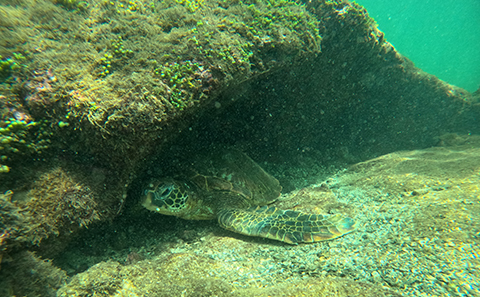A new study from the University of Southampton, in which CEAB researchers have collaborated, sheds light on the impact climate change is having on marine environments in a relatively recent global phenomenon known as ‘tropicalisation’.
In the ocean, tropical species are moving from the equator towards the poles as sea temperatures rise. Meanwhile, temperate species are receding as it gets too warm, they face increased competition for habitat, and new predators arrive on the scene, among other factors.
This mass movement of marine life, termed tropicalisation, is changing the ecological landscape of our oceans and leading to a cascade of consequences for ecosystems, biodiversity, and potentially the global economy.
The publication of the study in Trends in Ecology and Evolution coincides with the start of COP28, where global policymakers congregate and make pledges to tackle the impact of global warming. Researchers say we need to better understand the consequences of tropicalisation to predict its development, respond to its effects and aid conservation efforts to protect biodiversity around the world.
In recent years, climate change has altered the physical factors that affect species dispersal, such as ocean currents in areas that separate tropical/subtropical and temperate regions. These warm-water boundary currents are heating faster than the global seawater average, facilitating the poleward movement of species, and reinforcing the retraction of temperate species.
The first instance of this process was identified in the Mediterranean Sea, now considered a ‘tropicalisation hotspot’ due to an increase in tropical species present. Since then, tropicalisation has been documented globally along mid-latitudes.
Karolina Zarzyczny, lead author of the paper, said: “Tropicalisation is having a multitude of ecological and evolutionary consequences for species, communities, and whole ecosystems, with the potential to alter global diversity patterns. “Research conducted over the past twenty years has mostly focused on ecological impacts, meaning our understanding of its evolutionary consequences is limited. Given how closely ecology and evolution interact, a comprehensive strategy that involves monitoring and action, and integrates genetic and evolutionary research with the ecological changes we’re seeing is essential to better understand the drivers and consequences of tropicalisation.”
Given the close interaction between ecology and evolution, altered interactions between species can lead to the evolution of new traits or behaviors. For example, expanding tropical damselfishes and temperate reef fishes have been documented to alter their feeding and social behaviors to allow coexistence.
Other evolutionary consequences may involve the proliferation of more heat-resistant species or the loss of unique genetic diversity as temperate species recede. This reduction in genetic diversity could be problematic, as it may affect the species’ ability to adapt to future stressors.


